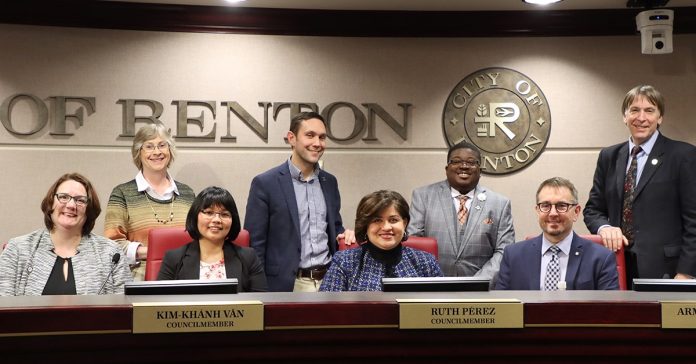Dismal councilmember pay is hampering local city governments across Washington State.
Understandably there might be some revulsion against the suggestion to pay politicians more. The association is often with fat cat millionaires living in mansions and living the high life. The lack of sympathy is understandable. These are people who wield significant power over their constituents and regularly feel out of touch with the average voter.
However, a councilmember’s pay is indicative of how active they will be in that job. Councilmembers will dedicate as much time to their position for as much as it sustains them. The problem that emerges is threefold:
- The amount of work it takes to be a good councilmember is not comparable to their wage;
- Low pay prevents many who cannot afford to run and represent their community, making the local council a rich man’s endeavor; and
- Insufficient awareness and resources in growing cities to respond to problems their communities face adequately.
For as much as we in the public might gripe and grouse about our elected officials, there are significant amounts of work involved for a good local representative. Tacoma At-Large City Councilmember Olgy Diaz, for example, embodies the active pursuit for not only legislation but also community engagement — hosting town halls, attending local events, community coffee talks, and engaging the community. This is beyond the scope of responsibility that embodies a city councilmember, where attending weekly city council meetings and communicating with City staff would suffice.
Despite the part-time status of Tacoma’s city council, Councilmember Diaz, as well as the whole council, are expected to perform a full-time service for Washington’s third largest city — understanding the community and legislating for them.
As a consequence of this demanding, time-consuming work, poorer Washingtonians are unable to dedicate their time to serving their community in the city council as they would be unable to afford the position as a full-time job due to income restraints. While there are some major cities in the state with full-time, living wage councils (such as Bellingham or Seattle), most are not. Everyone else relies on another source of income.
Consider the following graphs. The first details the annual salaries and equivalent wages available for city councilmembers in Washington’s larger cities (a population of 92,000 and above based on 2023 Census estimates), and the estimated cost of living in these cities. Assuming eight hours a day, five workdays a week, 52 weeks in a year, we see that many city councils fall behind even the state minimum wage.
| City | Annual Salary (Approx) | Hourly Wage (Approx) | Effective Since | Source |
| Seattle | $136,905.60 (District);$144,060.80 (At Large) | $65.82/hr (District);$69.26/hr (At Large) | 2023 | Link |
| Spokane | $49,799 | $23.94/hr | 2024 | Link |
| Tacoma | $63,086 | $30.32/hr | 2024 | Link |
| Vancouver | $29,693 | $14.28/hr | 2024 | Link |
| Bellevue | $28,728 | $13.81/hr | 2017 | Link |
| Kent | $36,000 | $17.30/hr | 2023 | Link |
| Spokane Valley | $21,600 | $10.38/hr | 2022 | Link |
| Everett | $32,388 | $15.57/hr | 2024 | Link |
| Renton | $21,000 | $10.10/hr | 2023 | Link |
| Yakima | $12,900 | $6.20/hr | 1999 | Link |
| Bellingham | $66,459.96 | $31.95/hr | 2023 | Link |
| Federal Way | $21,686.16 | $10.43/hr | 2021 | Link |
This comes from the issue that many city councils across the state follow the part time civilian legislature model the state follows. Washington’s citizen legislature is offered a $60,191 a year salary, with a per diem of $190. While this is quite a handsome chunk of change, considering the commute times, lodging, and demands of the legislature, it is still quite low. It’s hard to raise a family on such a wage. When looking at rising costs of living, traveling across the state or often staying in Olympia for the duration of legislative session, the expenses from the first quarter of the year start to rapidly increase.
Low pay creates a dependency on candidates who have that additional income or wealth to couch themselves during legislative sessions, or that have other work outside of their legislative roles. That external work can distract from constituents’ needs and the labor it takes to move major legislation. The same could easily be said for our city councilmembers.
The current cost of living in Washington is high, and only getting higher and harder for normal folk to get by. Washington’s average wage from 2021 was $81,245, according to the Office of Financial Management. When looking at the cost of living for several of Washington’s Metropolitan Statistical Areas, what is considered a living wage according to the Massachusetts Institute of Technology, is commonly out of step with what is provided by the 11 most populous cities for either a single adult or a family.
| MSA | Hourly Needed (Approx) | Source |
| Seattle-Bellevue-Tacoma | $21.84 (1 Adult)$38.86 (2 Adults, 1 Child) | Link |
| Spokane-Spokane Valley | $15.76 (1 Adult)$32.80 (2 Adults, 1 Child) | Link |
| Yakima | $16.23 (1 Adult)$32.89 (2 Adults, 1 Child) | Link |
| Bellingham | $17.30 (1 Adult)$34.30 (2 Adults, 1 Child) | Link |
| Portland-Vancouver-Hillsboro | $21.58 (1 Adult)$39.36 (2 Adults, 1 Child) | Link |
Considering Washington’s 2024 minimum wage is $16.28 an hour, it is quite startling that so many city councilmembers are making so little. The minimum cost of living in Washington comes to about $40,726.40 for a household of one. However, for the time and dedication necessary to occupy the office, that ought to come with a stable income. Seeking other forms of income to supplement your living while also in an elected office can create ethical issues if lawmakers are using their power and influence to advance their business interests. The appearance of corruption can sow seeds of distrust in the city government.
As citizens of democracy, we ought to trust our governments and elected officials to act in the interests of their constituents, not the interests of their pocketbooks. But paltry pay can invite lawmakers who are focused on their day job to turn government into a larger payday. Poor wages run into ethical issues and practical governance issues. It discourages diverse representation and encourages the revolving door from government to the private sector — taking their position of power to a happy, well-positioned business.
In addition to inadequate pay, many cities following the council-manager system rely on their city manager’s office to staff departments and agencies, but the council themselves are reliant on shared staff for the council supplied by the city manager’s office. All the while, city managers are some of the highest paid public servants in the entire state and exert enormous amounts of power in their positions to execute the city council’s agenda.
Cities in Washington are lagging in meeting the needs of their councilmembers, not only in their personal finances but also their office needs. Growing cities need responsive and representative councils to ensure they are meeting the specific challenges of their communities. Only recently have some cities, such as Bellingham, Tacoma, and Kent, taken the steps to increase their councilmember’s salary and turn being a councilmember into a full-time job.
For a responsive democratic city government to address the numerous crises cities across Washington face, full-time commitment is required. Without a dedicated and well-paid council and proper support in their legislative capacity, city councils are unable to properly respond to the needs of their citizens and only a small number of financially comfortable people will run the city. Not only would it boost responsiveness to constituents’ needs, but it would also secure Washington’s growing cities’ integrity as ethical, representative, and democratic bodies.

Collin Thrower
Collin Rhys Thrower has long had an interest in policy issues that affect lives – whether it is healthcare, welfare, civil rights, or democracy itself. He sees politics as a puzzle, trying to solve systemic problems that have the chance to either do great good in the world or enact great harm. Born and raised in San José, California, Collin has a thirst for knowledge, learning, and growing in new spaces. Residing in Tacoma, Collin has a Master’s in Political Science from Northeastern University.




